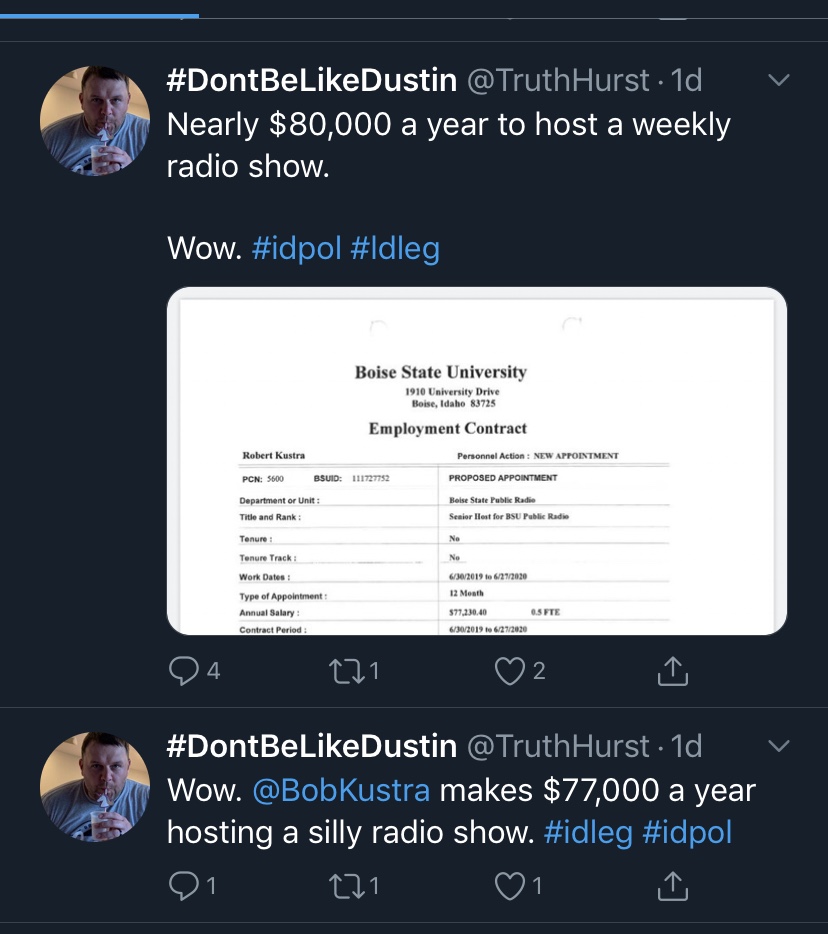A conservative lobbying group is blasting Boise State University — and a $77,230 radio contract with retired university President Bob Kustra.
In June, Kustra signed a one-year contract to serve as a “senior host” on Boise State Public Radio. The contract, and its details, went public this week, when Idaho Freedom Foundation and its spokesman posted screenshots on social media.
 “Wow,” spokesman Dustin Hurst tweeted Wednesday. “Bob Kustra makes $77,000 a year hosting a silly radio show.”
“Wow,” spokesman Dustin Hurst tweeted Wednesday. “Bob Kustra makes $77,000 a year hosting a silly radio show.”
University and public radio officials say the posts don’t tell the whole story. Kustra’s salary does not come from the state’s general fund — or, in other words, from tax dollars. And while Kustra’s contract discusses only his radio role, they say the longtime former president has a much broader community presence.
“It isn’t unusual for universities to keep a relationship with former presidents (especially wildly successful ones like Dr. Kustra), who have a lot of connections and broad sphere of influence,” Boise State spokesman Greg Hahn said Thursday.
The contract costs
In 2003, Kustra began his 15-year run as Boise State president, and launched his radio show, Reader’s Corner. The show has featured more than 500 interviews with authors and writers.
Kustra has remained on the air since his 2018 retirement — and as a result, he works under a more limited contract with the university.
The contract describes the radio host’s job as a half-time position. As a result, Kustra’s annual salary prorates to $74.26 per hour, according to the state’s Transparent Idaho database.
Kustra’s hourly salary eclipses Boise State Public Radio General Manager Tom Michael, who makes $128,294 annually; Program Director Paul Stribling, who makes $85,009 annually; and recently hired News Director Sasa Woodruff, who makes $74,006.
Both Kustra and Michael dismissed the salary comparisons.
“(It’s) like comparing apples and oranges, especially when you throw in my other responsibilities,” Kustra said in an email Thursday.
“Dr. Kustra, as president emeritus, is doing more for the university than being a radio host,” Michael said.
Kustra’s role in retirement
Citing his letter of appointment with Boise State, Kustra outlines his other responsibilities.
Kustra is expected to deliver guest lectures and write on higher education administration. Kustra says he is working on a chapter for a Harvard University book for new college presidents and chancellors, writing on the role of athletics in the life of a university president. Kustra also will teach this spring at Boise State’s Osher Lifelong Learning Institute.
“Reader’s Corner is hardly the only thing keeping me busy these days,” Kustra said Thursday.
Idaho Education News has submitted a public records request for Kustra’s letter of employment.
Where the money comes from
Obtained through a separate public records request, Kustra’s radio contract is only one page long, and it does not identify the source of his $77,230 salary.
But the money does not come from state appropriations, from the university budget passed by lawmakers and funded from tax dollars. Instead, Hahn said, the money comes from several other sources.
Foundation dollars account for some funding, Hahn said. Some funding comes from service fees paid by the Velma V. Morrison Center for the Performing Arts, ExtraMile Arena, the university’s parking and transportation office and the university’s print shop.
“These are entities with revenue sources so they basically pay in to the administrative and operations costs of the university,” Hahn said.
This isn’t the first time the Freedom Foundation has criticized spending at Boise State — even spending that doesn’t involve taxpayer money.
The foundation and conservative legislators have urged new President Marlene Tromp to disavow a series of diversity and inclusion programs, designed to support students of color and LGBT students. Grants and corporate sponsorships cover the costs of many of these programs, Betsy Russell of the Idaho Press reported in August.
“Though these dollars aren’t directly appropriated by the state, they are spent by the university,” Hurst said Thursday afternoon. “Spending $77,000 a year for Kustra’s weekly radio show is silly. Those dollars should be spent to provide scholarships for eager students.”
